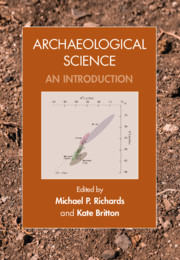Book contents
- Archaeological Science
- Archaeological Science
- Copyright page
- Contents
- Figures
- Tables
- Contributors
- Acknowledgements
- Part I Introduction
- Part II Biomolecular Archaeology
- Part III Bioarchaeology
- Part IV Environmental Archaeology
- 10 Vertebrate Zooarchaeology
- 11 Invertebrate Zooarchaeology
- 12 Palaeoethnobotany
- 13 Geoarchaeology
- Part V Materials Analysis
- Part VI Absolute Dating Methods
- Index
- References
11 - Invertebrate Zooarchaeology
from Part IV - Environmental Archaeology
Published online by Cambridge University Press: 19 December 2019
- Archaeological Science
- Archaeological Science
- Copyright page
- Contents
- Figures
- Tables
- Contributors
- Acknowledgements
- Part I Introduction
- Part II Biomolecular Archaeology
- Part III Bioarchaeology
- Part IV Environmental Archaeology
- 10 Vertebrate Zooarchaeology
- 11 Invertebrate Zooarchaeology
- 12 Palaeoethnobotany
- 13 Geoarchaeology
- Part V Materials Analysis
- Part VI Absolute Dating Methods
- Index
- References
Summary
Invertebrates (“animals without backbones”) constitute around 95 per cent of all existing fauna, and are therefore the majority of all living animals today. The remaining 5 percent of all animals are those from the sub-phylum Vertebrata that include fish, amphibians, reptiles, birds, and mammals (Barnes et al. 2001). Despite being present in most archaeological sites, invertebrates are often not adequately recovered or studied, partly due to the prevailing view among archaeologists that they are marginal for the understanding of past human behavior (Kenward 2009). Invertebrates (and their products) have been exploited throughout human history, not only as sources of food, but also for utilitarian purposes as tools, decorative objects, fibres, dyes, waxes, mastics, sealants, medicines, and poisons (Thomas and Mannino 2001). Detailed discussion of these uses by humans is not the scope of this chapter, which aims to highlight why the remains of these invertebrates hold great potential for archaeological science, as well as for reconstructing past environments beyond the scope of archaeology alone.
- Type
- Chapter
- Information
- Archaeological ScienceAn Introduction, pp. 233 - 275Publisher: Cambridge University PressPrint publication year: 2020
References
- 1
- Cited by

